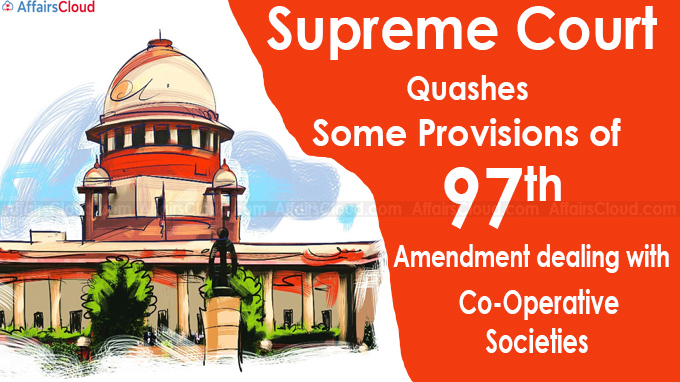
A 3-judge Supreme Court (SC) bench comprising Justices R F Nariman, K M Joseph and B R Gavai struck down certain parts of Part IXB of the Indian Constitution. Part IXB was inserted by the Constitution (97th Amendment) Act, 2011, it deals with incorporation, terms of members of board and its office bearers and effective management of cooperative societies.
- The SC Judgement however held that Part IXB of the Indian Constitution dealing with functioning and incorporation of multi-state co-operative societies will be operative.
Reason for Striking down
The 97th Constitutional Amendment required ratification by at least one-half of the state legislatures as per Article 368(2) of the Constitution, as it deals with an exclusive state subject (co-operative societies).
- As the ratification was not done, the 97th Amendment has been struck down.
- In 2013, Gujarat High Court had also struck down part of the Constitution (97th Amendment) Act, 2011 citing the same reasons.
97th Constitutional Amendment Act, 2011
i.The 97th constitutional amendment was passed by Parliament in December 2011 and came into effect from February 15, 2012.
ii.The change amended Article 19 (1) (c) to give protection to the cooperatives and inserted Article 43B and Part IX B, relating to them.
- Article 19(1)(c) guarantees freedom to form associations or unions or cooperative societies subject to certain restrictions.
- Article 43 B says that states shall endeavour to promote voluntary formation, autonomous functioning, democratic control and professional management of cooperative societies.
Ministry of Cooperation
Recently, The Central Government has created a separate ‘Ministry of Co-operation (Sahkarita Mantralaya)’ to provide a separate administrative, legal and policy framework for strengthening the Co-operative Movement in India.
- Union Home Minister Amit Shah will head the new ‘Ministry Of Cooperation’.
About Supreme Court
Chief Justice – Justice N.V. Ramana




